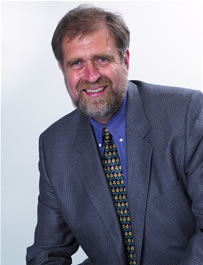Calit2 Governing Board Co-Chair Receives Humboldt Research Award
San Diego, CA, November 29, 2006 -- Frieder Seible, dean of the Jacobs School of Engineering at UCSD, has received a 2006 Humboldt Research Award. The prize from the Alexander von Humboldt Foundation is one of the most prestigious scientific honors in Germany, given to eminent foreign scholars in recognition of their lifetime academic achievements. Seible co-chairs Calit2's Governing Board with his counterpart, Nicholas Alexopoulos, at the University of California at Irvine.
|
Humboldt Research Award winners are invited to carry out research projects with a host university in Germany. Seible plans to investigate fundamental design concepts that could improve how structures perform under extreme loads caused by natural and manmade disasters. He will be hosted by the faculty of Civil Engineering at the Bauhaus-University Weimar and he will visit and collaborate with structural research institutes across Germany.
“Currently, we design our buildings and bridges in a linear fashion—first we complete a design to handle gravity and occupancy/traffic loads, then we add structural elements to deal with wind loads, then we consider the earthquake threat and add more features, and finally we look at blast vulnerability,” says Seible. “I’d like to develop a more holistic approach, namely to conceive a design that is suitable from the beginning for all of the possible loads on the structure.”
Seible says he draws inspiration for the project from Walter Gropius (1883-1969), a world renowned architect who espoused the design philosophy that “form follows function”. Seible wants to extend this philosophy to structures subjected to extreme loads to see if fundamental design concepts can be developed that lead to structures where the choice of system, form, and material can result in inherent functionality for earthquake and/or bomb blast loads. Gropius was the founder and head of the Bauhaus School from 1919 until 1928.
Seible’s expertise is in the design and assessment of structural systems under extreme loads. During his 23-year tenure at UC San Diego, he developed the Charles Lee Powell Structural Research Laboratories, the world’s foremost research and testing facility for large and full scale structural systems. Seible’s research is leading the development and validation of design and retrofit concepts for bridges and buildings in earthquake zones, and the hardening design and technology development of structures to protect against terrorist attacks, using conventional and new materials such as polymer matrix composites.
“We are honored to host Dr. Seible and to initiate further research collaboration between Bauhaus-University and UC San Diego,” says Professor Karl Beucke, deputy vice chancellor for research at Bauhaus-University Weimar. “His project will complement our ongoing work that was initiated under a Collaborative Research Center by the German Research Foundation on Materials and Structures for the Revitalization of Buildings. We expect that a holistic design approach for extreme loads will not only lead to better designs for new buildings, but also for the rehabilitation of existing buildings.”
Beucke says Bauhaus-University also plans to establish partnerships with leading German construction companies for the transfer of concepts developed through the project into practical applications.
Seible is a UC Distinguished Professor and holds the Walter J. Zable Dean’s Chair of Engineering. He is the Eric and Johanna Reissner Professor of Applied Mechanics and Structural Engineering, a member of the U.S. National Academy of Engineering, and chairman of the California Department of Transportation (Caltrans) Seismic Advisory Board. Seible received his undergraduate degree in civil engineering from the University of Stuttgart, Germany, his master’s degree from the University of Calgary, Alberta, Canada, and his Ph.D. from the University of California, Berkeley.
The Alexander von Humboldt Foundation is a non-profit organization established by the Federal Republic of Germany in 1953 for the promotion of international research cooperation. Each year, the Foundation grants up to 100 Humboldt Research Awards.
Related Links

